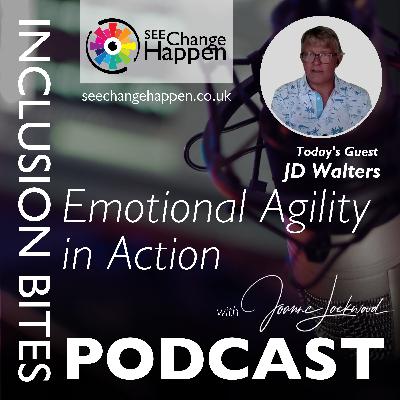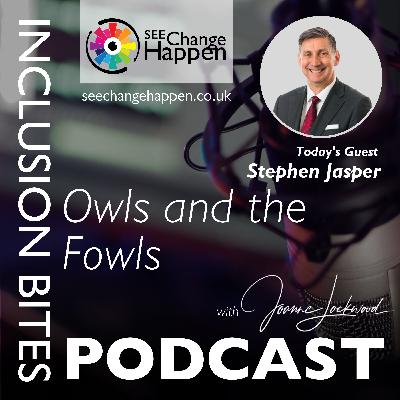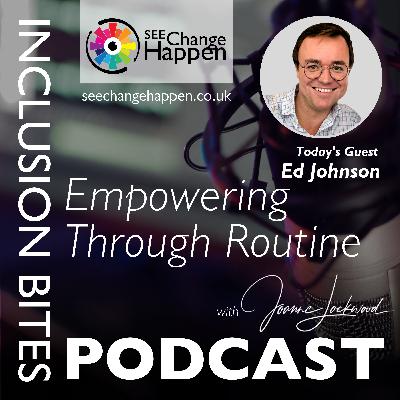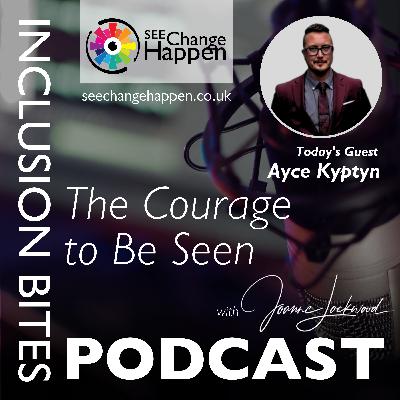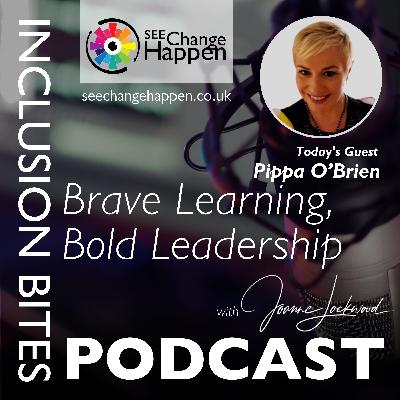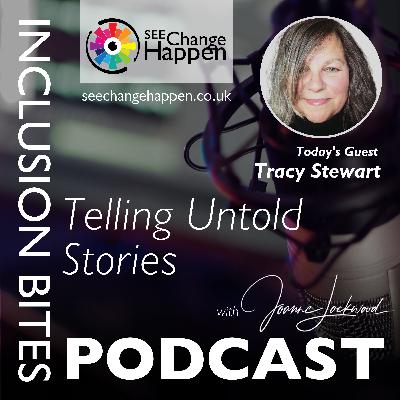Empowering Minds, One Reflex at a Time
Description

Fear Reflexes, Fidgety Bums, and the Path to Thriving Minds
Niki McGlynn unpacks the hidden world of neurodevelopment, revealing how understanding primitive reflexes and movement empowers individuals to embrace their neurodiversity, unlock potential, and foster a deeper sense of safety and belonging.
In this enlightening episode of The Inclusion Bites Podcast, Joanne Lockwood welcomes Niki McGlynn to unravel the intersection of neurodevelopment and inclusion with a focus on the often-overlooked impact of primitive reflexes. Together, they explore how foundational movement patterns established in early childhood influence lifelong learning, social integration, and overall wellbeing—especially for neurodivergent individuals and those with conditions such as ADHD and dyslexia. The conversation gracefully weaves personal experiences with expert insights, delving into the challenges faced both in the classroom and beyond when neurodiversity is misunderstood or missed altogether. Joanne and Niki challenge listeners to consider how evolving societal expectations and childhood environments may inadvertently hinder the natural calibration of neurodevelopment, while uncovering practical steps to rekindle these vital connections through movement in later life.
Niki is a neurodevelopment therapist, trainer, and ADHD coach based in the south of England, whose journey stems from her own experiences with undiagnosed dyslexia and ADHD. Her expertise lies in translating the often arcane science of neurodevelopment into real-world, movement-based strategies that empower clients of all ages to unlock their potential. Niki’s approach is both deeply personal and firmly practical; she draws on her experience supporting her daughter through the diagnostic labyrinth, which propelled her to become a practitioner and trainer herself. Her work centres on understanding and integrating primitive reflexes—those innate patterns every infant develops—that often leave a lasting imprint on learning, behaviour, and emotional regulation if not matured beyond infancy. Through one-to-one clinical practice and public education, Niki is dedicated to demystifying these mechanisms and equipping individuals and families with tools to thrive.
Listeners are invited to reflect on how society can better support neurodivergent minds and why traditional approaches to learning and behaviour may need rethinking. A key takeaway from this episode is the transformative potential of addressing primitive reflexes through purposeful movement, breaking cycles of frustration and enabling inclusion from an authentic, physiological foundation. This is a must-listen for anyone intrigued by the science of belonging, neurodiversity, and how simple, mindful changes can fuel empowerment at every stage of life.
Shownotes:
AI Extracts and Interpretations
The Inclusion Bites Podcast - #166 Empowering Minds, One Reflex at a Time
— app.castmagic.io
Other Links
SEE Change Happen: The Inclusive Culture Experts
Inclusion Bites Podcast on YouTube
Clips and Timestamps
Inclusion and Belonging: Remember, everyone not only belongs, but thrives.
— Niki McGlynn [00:00:26 → 00:00:29 ]
Viral Topic: Translating Neurodevelopment Science
Quote: “My superpower… is translating neurodevelopment science into life changing movement strategies.”
— Niki McGlynn [00:01:44 → 00:01:48 ]
Understanding Dyslexia: “He wasn’t stupid, he wasn’t incapable of functioning in the world, it was just. He was incapable of learning his Alphabet, associating the letter with the object and then.”
— Niki McGlynn [00:06:57 → 00:07:09 ]
Speed Reading and Comprehension: “Yeah, because, you know, we read a book, we read something on the screen, whatever it is, we’re not reading every letter, we’re recognising the peaks and troughs and the pattern of that word, aren’t we? We can look at whole sentences almost and gather the essence of what it’s trying to say without reading every word.”
— Niki McGlynn [00:07:43 → 00:07:59 ]
How Babies Learn: “That’s all the newborn and the young, the toddler’s doing is calibrating all these senses and muscle movements.”
— Niki McGlynn [00:23:51 → 00:23:57 ]
Building Spatial Awareness: “So what we talk about here is doing exercises, movements that allow you to build that sort of brain image of yourself, your spatial awareness of where your parts are, where your senses are, and connect those little dots in your brain.”
— Niki McGlynn [00:32:14 → 00:32:29 ]
From Chickenpox Parties to COVID Fears: “In the past, you know, we would send our children to chickenpox parties and we deliberately make sure that our children were being exposed to as many coughs and sneezes as possible. Now we’re fighting back against vaccines and saying they must be dangerous.”
— Niki McGlynn [00:38:15 → 00:38:28 ]
Dangerous Go Kart Design: “Quick release wheels on a go kart were not a good design feature, so we had to fix that one and put some split pins in to stop them coming off.”
— Niki McGlynn [00:44:39 → 00:44:47 ]
Entrepreneurship and Academic Performance: “I think I saw something on. I think it was LinkedIn or some article on one of the car news sites talking about how this is correlation between entrepreneurship and not being an A grade student. Because being perceived a failure or having to try hard or not always succeeding gives you better resilience, better adaptability, which is an entrepreneurial trait. Whereas if you’re used to getting everything right, your success comes easy. You’ve never experienced failure, which is what we talked about earlier, about this development stage where you have to learn what failure feels like in order to be able to cope and adapt.”
— Niki McGlynn [00:54:14 → 00:54:51 ]
How Comedians Think Differently: “They see the world differently, they find different things funny, they see patterns and stuff that are humorous often and not being governed by social contracts or rules of how you supposed to behave.”
— Niki McGlynn [00:55:33 → 00:56:07 ]
Definition of Terms Used
Primitive Reflexes
- Definition: Primitive reflexes are involuntary movement patterns originating in the central nervous system, present in infants from conception to about one year of age, which prime the developing brain for later voluntary movement and neural integration.
- Relevance: This episode highlights how non-integration or persistence of primitive reflexes beyond infancy can impact socialisation, sensory processing, and learning, especially for neurodivergent individuals, such as those with ADHD or dyslexia.
- Examples: The Moro reflex (startle reflex) in babies, fear paralysis reflex, and the spinal galant reflex influencing fidgetiness or attention issues.
- Related Terms: Neurodevelopment, Reflex Integration, Motor Development, Sensory Processing Disorder
- Common Misconceptions: Many believe primitive reflexes simply disappear; in reality, they are meant to be integrated into the nervous system, and can affect behaviour and learning if not properly integrated.
Neck Reflexes
- Definition: Neck reflexes refer to a group of primitive reflexes coordinating neck and head movements with body posture and eye tracking, essential for motor control and spatial awareness in early development.
- Relevance: The episode discusses how persistence of neck reflexes can lead to challenges with handwriting, spatial awareness, body coordination, and organisation skills in both children and adults.
- Examples: A retained tonic neck reflex causing a child’s arm to involuntarily extend while writing or turning their head, affecting classroom posture and reading.
- Related Terms: Asymmetrical Tonic Neck Reflex (ATNR), Symmetrical Tonic Neck Reflex (STNR), Motor Coordination, Proprioception
- Common Misconceptions: It is ofte


 Published: 10.07.2025
Published: 10.07.2025 Duration:
Duration: 
